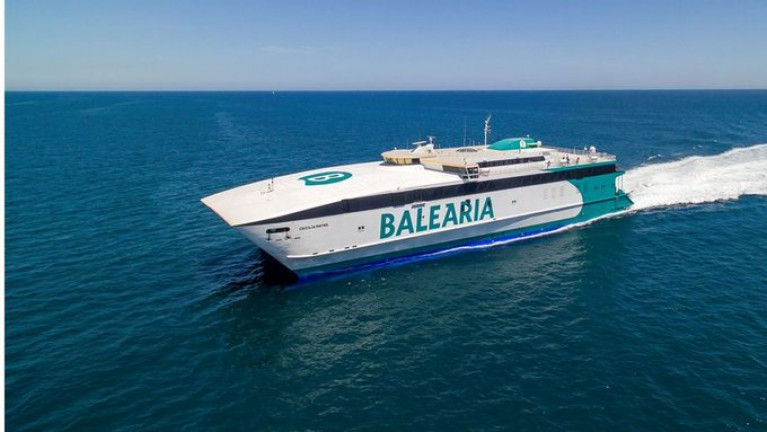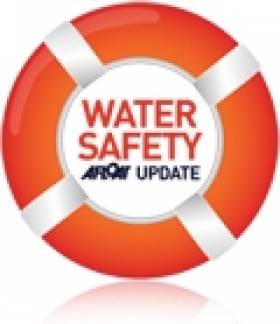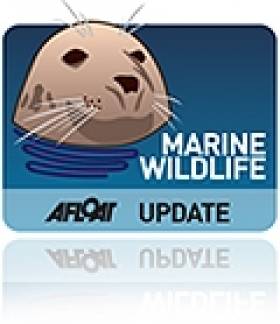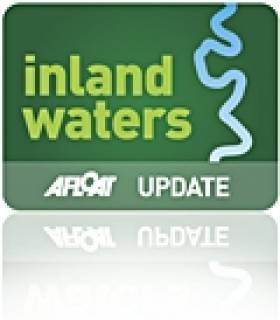Displaying items by tag: Summer
A former Irish Sea fast ferry which operates from Spain, will this summer link Barcelona to Alcudia, Mallorca with Ciutadella, Minorca thanks to Palma-based operator, Baleària.
As Majorca Daily Bulletin reports, the ferry company unveiled plans for the route using the Australian-built Cecilia Payne. The vessel is named after the British–American astrophysicist.
Between 1999 and 2018 the catamaran craft custom-built for Irish Ferries served as Jonathan Swift on the Dublin-Holyhead route.
On its entry into service in July 1999, Jonathan Swift increased Irish Ferries' passenger capacity on the Dublin-Holyhead route by 73% and its car capacity by 50%.
The fastferry has spent its entire career on this route (until sold to Balearia in 2018), operating alongside the company's conventional ferries.
The craft which has a capacity for 800 passengers and 200 cars.
Afloat.ie adds the 'Swift' was replaced by another fast-ferry the Dublin Swift which in April this year resumed fast-ferry crossings on the Ireland-Wales route.
The successor fast-ferry took on the name of 'Dublin Swift' as used by Irish Ferries to market the Jonathan Swift.
This Friday Last Day for 2012 Fingal Lifeguard Applicants
#WATER SAFETY - This coming Friday 30 March is the closing date for applications for Fingal County Council beach lifeguards for the 2012 summer season.
Lifeguard cover will be provided on Fingal beaches on weekdays and weekends 11am to 7pm from 2 July till the last week of August, depending on weather and staff levels.
Beaches and bathing places scheduled to be guarded this summer include Balbriggan (front beach), Skerries South, Loughskinny, Rush North and South Shores, Portrane (Tower Bay and The Brook), Donabate, Malahide, Portmarnock, Sutton (Burrow Road) and Howth (Claremount).
Applicants must be not less than 17 years of age on 1 May 2012. Application forms are available to download HERE.
New Season of Summer Whale Watching Courses on Cape Clear
#MARINE WILDLIFE - The Irish Whale and Dolphin Group (IWDG) has announced another series of its popular whale watching courses on Cape Clear in West Cork this summer.
The courses cater for adults keen to learn more about whales and dolphins in Irish waters and how to observe, record and identify them. They will feature a mixture of workshops and field trips, including cliff and boat-based whale watches.
Three weekend courses will take place on 25-27 May, 20-22 July and 7-9 September, led by IWDG sightings co-ordinator Pádraig Whooley. All are open to IWDG members and non-members alike, but places are limited to 20 places each weekend on a first-come-first-served basis.
Admission is €70 for IWDG members (€90 for non-members), with a non-refundable deposit of €25 required. Please note that this fee does not cover transport to Cape Clear, food or accomodation (which is limited in high summer) or any boat trips. As the itinerary will be weather-dependant, some flexibility will be required.
More information on the weekends and booking details are available at the IWDG website HERE.
In other IWDG news, the group has secured another grant from the Island Foundation to continue its humpback whale research in Cape Verde this spring and summer.
A shore-based team will be stationed in Boa Vista in an area that is "possibly the most important site for breeding humbacks in the entire northeast Atlantic".
Waterways Ireland wishes to advise masters and owners that as part of the Docklands Summer Festival, yacht racing will take place in the Grand Canal Basin from 09.00 hrs until 16.00hrs on Sun 26th June.
On Sat 25th, there will be a practice session from 13.00hrs until 19.00hrs.
In addition 'Come and Try It' activities including canoeing and paddle-boarding for novices will take place in the inner basin beside the Waterways Ireland Visitors Centre, from 10.00hrs until 18.00 on both days.
There will be restricted movement of vessels in the Grand Canal Basin during the events, lock operations will be suspended once the events have commenced.
Commercial operators in the Dock are requested to adhere to these restrictions and the planned routes and schedules for the duration of the event.
Boat owners presently in the Grand Canal Basin should comply with all reasonable instructions and guidance from event marshals.
New Kit Range from Helly Hansen
Under the Technical range, the collection builds upon the brand's fabric and technological expertise, utilising HH Cool fabrics and LIFA Stay Dry Technology on the inside for dryness, with a Polyester exterior to evaporate sweat and cool the skin. In addition, a new series of highly breathable, windproof jackets have been designed to help athletes to regulate body temperature in cool conditions.
The Outdoor Technical collection is a professional-grade the Odin series of outerwear, insulators and base layers expands with the introduction of the Odin Lightweight Jacket. This jacket is designed to meet the tough specifications of mountain guides.
The brand also includes a versatile rainwear collection of lightweight, durable Dakota and Anchorage Jackets for men, and Aspen and Vancouver Jackets for women.
The Helly Hansen range in Watersports, has earned the trust and confidence of professional and recreational sailors for generations. In the Spring, the new Hydro Power series of dry tops, waterproof smocks, jackets, pants and sportswear for sport boat enthusiasts will also be launched.
In the Footwear Watersports range the new Watermoc grips slick rocks and decks and guards the feet from contact with unseen sea life beneath the surface.
Helly Hansen blends its nautical roots with progressive style in the Latitude 90 Leather for men and women. The Latitude 90 works perfectly when worn with denim, chinos or shorts.
'Ask and Embla' Helly Hansen's statement fashion collection goes soft with waterproof, breathable softshell coats for urban adventures. The collection of stylish sweaters, shorts, pants and footwear has been designed in clean Scandinavian styles to complement the range.



























































